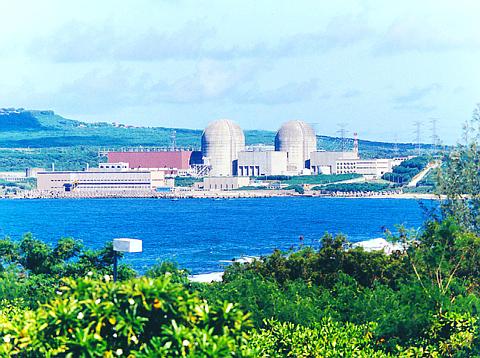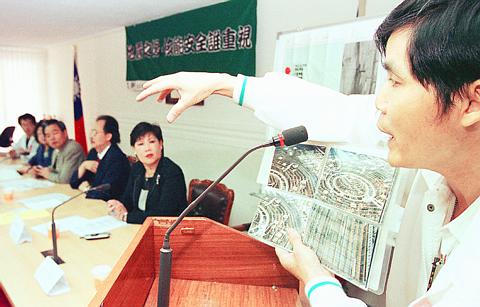Environmentalists and lawmakers urged the government yesterday to comprehensively review the safety of Taiwan's three nuclear power plants following the earthquake, and to reconsider plans for a fourth nuclear power facility in Taipei County.
In the wake of the devastating temblor on Sept. 21, which badly damaged electricity transmission around the island, especially in central Taiwan, the Taiwan Power Company (
Taipower officials said that earthquake-monitoring systems installed in all its nuclear plants trigger a shut down to prevent radioactive contamination when there is a quake registering more than 5.0 on the Richter scale.

PHOTO: TAI LI-AN
But environmentalists and lawmakers said yesterday the government should not risk Taiwan's safety with its belief that monitoring systems will prevent nuclear power plant accidents.
"We worry particularly about the first two plants in northern Taiwan, which were built before the first regulations for building earthquake-resistant constructions were issued in 1982," said DPP lawmaker Lin Chung-mo (
Two of the nuclear power plants in Taipei County are situated 8km and 13km respectively from the Hsinchuang Fault (新莊斷層), also known as the Chinshan Fault (金山斷層). The third facility is in Pingtung County, 35km from the boundary of the Philippine and Eurasian tectonic plates.

PHOTO: CHIANG YING-YING, TAIPEI TIMES
"In addition to having built its three existing power plants on dangerous sites, Taipower is planning to build the fourth plant on a sand dune and coastal alluvium along the north coast, where sand, silt and gravel cover a clay layer underground," said Lai Wei-chieh (賴偉傑), from Taiwan Environmental Protection Union's Taipei Chapter (TEPUTC, 台灣環保聯盟台北分會).
Responding to the claims, officials from Taipower said yesterday that though the three plants were located near fault lines they were built to be earthquake-resistant and plans for future plants have been thoroughly researched.
"To avoid any threats posed by active fault lines, we must check the terrain and collect geological records on previous earthquakes when proposing a site for a nuclear plant," said Li Chuan-lai (
But, lawmakers also criticized Taipower for its safety record, claiming the state-run company had paid inadequate attention to earthquake drills.
"Taipower should have at least one drill every two years at every plant, but what we can see from the records is that there was only one drill at the first plant since 1992, two at the second plant since 1989, and two at the third plant since 1992," said DPP lawmaker Fan Hsun-lu (
Taipower officials, however, told reporters later that the legislators' knowledge of nuclear energy regulations was flawed.
"I think Fan has misunderstood the regulation regarding drills. We only have to have one drill at any of the existing plants," said Taipower's Li.
Lu Chen-tsang (
Ritsuya Okuno (
To stress the importance of disaster prevention, Okuno pointed to the recent nuclear contamination accident at the JCO uranium-processing plant in Japan as an example.
"Japanese officials had ensured the safety of its nuclear power industry, but still such an accident happened unexpectedly," said Okuno, who said a fourth plant in Taipei County should be reconsidered.

The US government has signed defense cooperation agreements with Japan and the Philippines to boost the deterrence capabilities of countries in the first island chain, a report by the National Security Bureau (NSB) showed. The main countries on the first island chain include the two nations and Taiwan. The bureau is to present the report at a meeting of the legislature’s Foreign Affairs and National Defense Committee tomorrow. The US military has deployed Typhon missile systems to Japan’s Yamaguchi Prefecture and Zambales province in the Philippines during their joint military exercises. It has also installed NMESIS anti-ship systems in Japan’s Okinawa

‘WIN-WIN’: The Philippines, and central and eastern European countries are important potential drone cooperation partners, Minister of Foreign Affairs Lin Chia-lung said Minister of Foreign Affairs Lin Chia-lung (林佳龍) in an interview published yesterday confirmed that there are joint ventures between Taiwan and Poland in the drone industry. Lin made the remark in an exclusive interview with the Chinese-language Liberty Times (the Taipei Times’ sister paper). The government-backed Taiwan Excellence Drone International Business Opportunities Alliance and the Polish Chamber of Unmanned Systems on Wednesday last week signed a memorandum of understanding in Poland to develop a “non-China” supply chain for drones and work together on key technologies. Asked if Taiwan prioritized Poland among central and eastern European countries in drone collaboration, Lin

NO CONFIDENCE MOTION? The premier said that being toppled by the legislature for defending the Constitution would be a democratic badge of honor for him Premier Cho Jung-tai (卓榮泰) yesterday announced that the Cabinet would not countersign the amendments to the local revenue-sharing law passed by the Legislative Yuan last month. Cho said the decision not to countersign the amendments to the Act Governing the Allocation of Government Revenues and Expenditures (財政收支劃分法) was made in accordance with the Constitution. “The decision aims to safeguard our Constitution,” he said. The Constitution stipulates the president shall, in accordance with law, promulgate laws and issue mandates with the countersignature of the head of the Executive Yuan, or with the countersignatures of both the head of the Executive Yuan and ministers or

BACK TO WORK? Prosecutors said they are considering filing an appeal, while the Hsinchu City Government said it has applied for Ann Kao’s reinstatement as mayor The High Court yesterday found suspended Hsinchu mayor Ann Kao (高虹安) not guilty of embezzling assistant fees, reducing her sentence to six months in prison commutable to a fine from seven years and four months. The verdict acquitted Kao of the corruption charge, but found her guilty of causing a public official to commit document forgery. The High Prosecutors’ Office said it is reviewing the ruling and considering whether to file an appeal. The Taipei District Court in July last year sentenced Kao to seven years and four months in prison, along with a four-year deprivation of civil rights, for contravening the Anti-Corruption